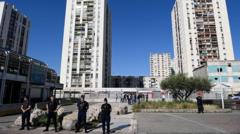This latest incident marks a significant downturn in Algeria-France relations, rooted in historical grievances and recent diplomatic failures.
Tensions Escalate: Algeria Expels French Officials Amid Political Strife

Tensions Escalate: Algeria Expels French Officials Amid Political Strife
Algerian authorities expel 12 French diplomats as diplomatic relations deteriorate over kidnapping allegations.
Algeria has heightened diplomatic tensions with France by expelling 12 French officials, including diplomats stationed in the French Embassy and consulates. The Algerian Foreign Ministry issued an ultimatum on Monday, giving the officials only 48 hours to vacate the country.
The expulsion follows the arrest of an Algerian official in France, linked to the alleged kidnapping of a popular Algerian influencer known as “Amir DZ.” The Moroccan statesman characterized the French actions as a “shameful act” intended to undermine Algeria’s dignity and indicated that the official’s consular status was disregarded during these proceedings.
Jean-Noël Barrot, France’s Foreign Minister, reacted quickly, threatening retaliatory measures against Algeria, stating, “We are ready to act.” He urged Algerian authorities to reconsider their decision before it takes full effect.
The Algerian official has been charged with serious offenses, including “abduction and unlawful imprisonment in connection with a terrorist act,” according to France’s national antiterrorism prosecutors. His arrest follows a longstanding campaign led by Algeria for Amir DZ’s extradition on various fraud and terrorism charges; these requests have been repeatedly denied by French courts.
Political scientist Khadija Mohsen-Finan noted that both nations remain entrenched in historical traumas that complicate their relationship, suggesting that there are factions in both Algeria and France that benefit from continued discord.
The tortured history between the two countries, marked by a violent colonial past, continues to inform modern political relations. Algeria’s fight for independence in 1962 left deep scars, and recent diplomatic encounters, such as Barrot’s trip to Algiers, have offered little solace amid growing hostilities.
Relations seemed to improve slightly following a phone conversation between French President Emmanuel Macron and Algerian President Abdelmadjid Tebboune in late March; however, this phase of conciliation has since proven deceptive.
The diplomatic climate has worsened significantly since the previous summer when France openly supported Morocco's claims over Western Sahara, a contentious issue that Algeria disputes vehemently. The situation has been further exacerbated by the November arrest of Boualem Sansal, an Algerian writer accused of undermining national unity, a case that has drawn outrage from both Macron and the broader French intellectual community. Sansal, now 80 years old, was sentenced to five years in prison just last month—a move that continues to stoke tensions between the two nations.
The expulsion follows the arrest of an Algerian official in France, linked to the alleged kidnapping of a popular Algerian influencer known as “Amir DZ.” The Moroccan statesman characterized the French actions as a “shameful act” intended to undermine Algeria’s dignity and indicated that the official’s consular status was disregarded during these proceedings.
Jean-Noël Barrot, France’s Foreign Minister, reacted quickly, threatening retaliatory measures against Algeria, stating, “We are ready to act.” He urged Algerian authorities to reconsider their decision before it takes full effect.
The Algerian official has been charged with serious offenses, including “abduction and unlawful imprisonment in connection with a terrorist act,” according to France’s national antiterrorism prosecutors. His arrest follows a longstanding campaign led by Algeria for Amir DZ’s extradition on various fraud and terrorism charges; these requests have been repeatedly denied by French courts.
Political scientist Khadija Mohsen-Finan noted that both nations remain entrenched in historical traumas that complicate their relationship, suggesting that there are factions in both Algeria and France that benefit from continued discord.
The tortured history between the two countries, marked by a violent colonial past, continues to inform modern political relations. Algeria’s fight for independence in 1962 left deep scars, and recent diplomatic encounters, such as Barrot’s trip to Algiers, have offered little solace amid growing hostilities.
Relations seemed to improve slightly following a phone conversation between French President Emmanuel Macron and Algerian President Abdelmadjid Tebboune in late March; however, this phase of conciliation has since proven deceptive.
The diplomatic climate has worsened significantly since the previous summer when France openly supported Morocco's claims over Western Sahara, a contentious issue that Algeria disputes vehemently. The situation has been further exacerbated by the November arrest of Boualem Sansal, an Algerian writer accused of undermining national unity, a case that has drawn outrage from both Macron and the broader French intellectual community. Sansal, now 80 years old, was sentenced to five years in prison just last month—a move that continues to stoke tensions between the two nations.





















